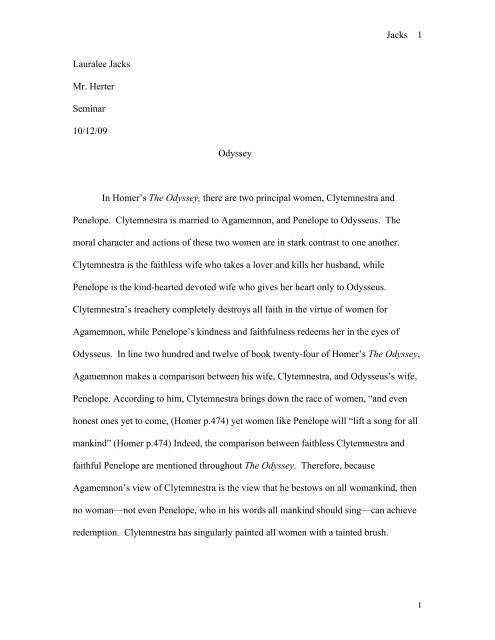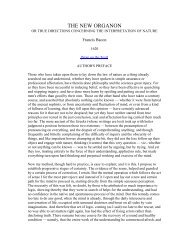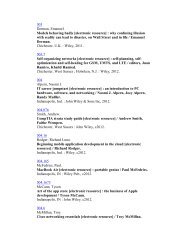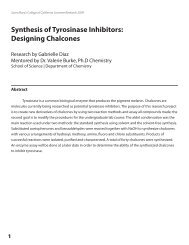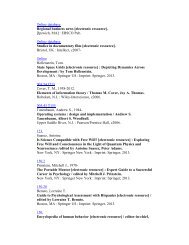The Odyssey Essay
The Odyssey Essay
The Odyssey Essay
You also want an ePaper? Increase the reach of your titles
YUMPU automatically turns print PDFs into web optimized ePapers that Google loves.
Jacks 1<br />
Lauralee Jacks<br />
Mr. Herter<br />
Seminar<br />
10/12/09<br />
<strong>Odyssey</strong><br />
In Homer’s <strong>The</strong> <strong>Odyssey</strong>, there are two principal women, Clytemnestra and<br />
Penelope. Clytemnestra is married to Agamemnon, and Penelope to Odysseus. <strong>The</strong><br />
moral character and actions of these two women are in stark contrast to one another.<br />
Clytemnestra is the faithless wife who takes a lover and kills her husband, while<br />
Penelope is the kind-hearted devoted wife who gives her heart only to Odysseus.<br />
Clytemnestra’s treachery completely destroys all faith in the virtue of women for<br />
Agamemnon, while Penelope’s kindness and faithfulness redeems her in the eyes of<br />
Odysseus. In line two hundred and twelve of book twenty-four of Homer’s <strong>The</strong> <strong>Odyssey</strong>,<br />
Agamemnon makes a comparison between his wife, Clytemnestra, and Odysseus’s wife,<br />
Penelope. According to him, Clytemnestra brings down the race of women, “and even<br />
honest ones yet to come, (Homer p.474) yet women like Penelope will “lift a song for all<br />
mankind” (Homer p.474) Indeed, the comparison between faithless Clytemnestra and<br />
faithful Penelope are mentioned throughout <strong>The</strong> <strong>Odyssey</strong>. <strong>The</strong>refore, because<br />
Agamemnon’s view of Clytemnestra is the view that he bestows on all womankind, then<br />
no woman—not even Penelope, who in his words all mankind should sing—can achieve<br />
redemption. Clytemnestra has singularly painted all women with a tainted brush.<br />
1
Jacks 2<br />
Homer mentions the treacherous deeds of Clytemnestra, of how she took a lover<br />
and killed her husband. Not only was it because she killed her husband that made her a<br />
disgrace in society, but it was the fact that she took a lover while her husband was away<br />
fighting wars. By not doing what she should have done, which was to remain faithful to<br />
her husband, meant that she was faithless, and that she should deserve to be branded in<br />
the eyes of all men.<br />
On the other hand, Penelope remained faithful to Odysseus. She had forty suitors<br />
coming to seek her hand, but she had not been tempted as Clytemnestra had been, to take<br />
a lover and rule by her side. Instead, she was crying and eagerly awaiting the arrival of<br />
her husband Odysseus. She had waited twenty years for Odysseus to arrive and no one<br />
had ever been with her. <strong>The</strong> justification of Penelope’s great virtue and trust is proven<br />
when she asks Odysseus about the great rooted bed. This not only mentions that<br />
Odysseus is alive and with her, it proves her faithfulness. If she was faithless, then her<br />
suitors would talk about the great rooted bed, and Penelope would not have asked it of<br />
him to see if it was her true husband because it would be common knowledge. <strong>The</strong>refore,<br />
because of Penelope’s devotion to Odysseus, she should be “a song for all mankind.”<br />
However, she has not redeemed the race of women, even for “honest ones yet to<br />
come.” Her reputation is as tainted as Clytemnestra according to Agamemnon as he<br />
points out to Odysseus:<br />
“So even your own wife never indulge her too far. Never reveal the whole truth<br />
whatever you may know; just tell her a part of it, be sure to hide the rest. <strong>The</strong> time for<br />
trusting women’s gone forever!” (Homer 263-264).<br />
2
Jacks 3<br />
It is this mistrust of all females that Agamemnon told Odysseus about. Odysseus<br />
listened to what Agamemnon said, and he used it when he was about to slaughter the<br />
suitors. Breaking trust is the main reason why Clytemnestra has tainted the blood of<br />
womankind. Agamemnon had trusted his wife so blindly that he didn’t see his own<br />
downfall coming. He expected his wife to come give him a bath and feast, and for<br />
Clytemnestra to be happy that he came home and remain the loyal and faithful spouse<br />
that she was supposed to be. By trusting his wife, he must have realized what was his<br />
downfall was. When Clytemnestra killed him, he had completely lost his trust for her and<br />
viewed every woman the same way as Clytemnestra, that they were devoid of honesty<br />
and were devious in their hearts.<br />
On the other hand, although Odysseus did trust his wife, he still had to test her to<br />
prove that she was trustworthy. Trust had to be earned and not given, and while he<br />
believed in her faithfulness he was cautious to test it. Agamemnon gave Clytemnestra his<br />
trust even though she did not earn it. <strong>The</strong>refore, it was Agamemnon’s own misjudgment<br />
and failing that led to Clytemnestra’s downfall. Penelope had earned Odysseus’s trust.<br />
She was not only faithful, but she was kind. She treated everyone as her equal, as it was<br />
in the case when Odysseus pretended to be a beggar. Penelope had seen how the suitors<br />
treated the disguised Odysseus, and she could not see him being treated badly. Because<br />
Penelope could not tolerate cruelty in her kingdom to people below her status, Odysseus<br />
came to her instead of her maids. She treated him kindly by bathing him. After the<br />
meeting, Odysseus turned to her and said:<br />
“Before that crew can handle that polished bow, string it taut and shoot through<br />
the axes Odysseus man of exploits will be home with you!” (Homer p.409)<br />
3
Jacks 4<br />
Odysseus must have trusted her enough to tell her this piece of information about what he<br />
was going to do without giving himself away. Odysseus tested her to prove that she was<br />
trustworthy. <strong>The</strong>refore, unlike Clytemnestra, Penelope earned her husband’s trust, where<br />
as Clytemnestra did not. Whatever trust Agamemnon had given her, she had lost it.<br />
Penelope on the other hand had gained it.<br />
Agamemnon’s statement that “the time for trusting women is gone forever,” may<br />
seem like a bitter man wanting vengeance on his wife, but there must have been a<br />
significance to the reason why Clytemnestra had branded all women for generations in<br />
the eyes of men. When Clytemnestra is being described as taking a lover and killing her<br />
husband, she seems like a Gorgon lusting for blood. However when Orestes, her son,<br />
killed her, he seemed like a hero who deserved praise for killing his mother for what she<br />
had done to his father. What Clytemnestra had done to her husband was done of pure<br />
treachery. Agamemnon did not forget Clytemnestra’s deed even in death. This shows that<br />
Agamemnon forgot the good things his wife had done and remembered only the evil<br />
deeds of Clytemnestra.<br />
An example of how Agamemnon remembered the evil things his wife had done is<br />
shown in the way Odysseus treated the suitor Amphinomus. Amphinomus had treated the<br />
disguised Odysseus well, and Odysseus warned him to leave or else he would be<br />
slaughtered among the other suitors. Yet when it was time for Odysseus to slaughter him,<br />
he made a justification of why he should kill him:<br />
“You never imagine I returned from Troy, so cocksure that you bled my house,<br />
ravished my women, and wooed my wife, your doomed is sealed!” (Homer p. 441)<br />
4
Jacks 5<br />
Because of these evil doings, Odysseus neglected Amphinomus’s good deeds and used<br />
the bad for his purpose of killing him. Similarly, like Odysseus, because of one evil act<br />
Clytemnestra had committed, Agamemnon never forgot and used it as an excuse to brand<br />
all womankind for generations.<br />
When people like Penelope are linked with people like Clytemnestra, it is hardly<br />
impossible for someone to overlook the good instead of the bad. For the “honest ones yet<br />
to come” are forever tainted with the brand of evil. According to Agamemnon there is no<br />
middle ground for women, no characteristic that is good. <strong>The</strong>y are forever branded with<br />
evil because of what Clytemnestra had done. When Penelope is being praised as virtuous,<br />
devoted, and loyal to her husband, Agamemnon cannot help but remember what<br />
Clytemnestra had done to him, and mistrusted all the women of her kind. Penelope was<br />
just one of the few people who happened to be like Clytemnestra, even though her actions<br />
did not justify the comparison. Penelope still should be rewarded and praised for her<br />
virtues, but Agamemnon cannot forget the crimes of what Clytemnestra has done.<br />
Because there is no middle ground in Agamemnon’s book, Agamemnon will praise her<br />
and “make her a song for all mankind.” She did not redeem the race of womankind, but<br />
she should still be honored in the eyes of men. <strong>The</strong>refore, even if there were more women<br />
like Penelope, they would still have the scar of Clytemnestra’s treachery, and<br />
Agamemnon sounds the warning to men that their wives have the capability to do the<br />
same to them as Clytemnestra had done to him.<br />
Another reason why Agamemnon was so judgmental about women and “honest<br />
ones yet to come” was his own expression about his own failings, and how he could not<br />
foresee what his fate would be. Agamemnon’s judgment was a way that he could look<br />
5
Jacks 6<br />
back on his life and think of a way he could avoided his fate, if only he had not made<br />
mistakes. By not taking any of the blame for his own mistakes, he had focused all of his<br />
condemnation on Clytemnestra and all women, even honest ones like Penelope. By<br />
shifting the blame from himself and onto someone else’s shoulders then he could be<br />
innocent for all his crimes and show that his death was sad and blameworthy. It may not<br />
have given him the vengeance that he wanted, but it would compensate that he was not in<br />
the wrong.<br />
In closing, the actions of two women, Clytemnestra and Penelope, affect<br />
Agamemnon and Odysseus in different ways. <strong>The</strong> naiveté of Agamemnon, and his<br />
subsequent betrayal, causes him to condemn all women of all generations to come. Even<br />
the kindly Penelope, whom he acknowledges as being a woman fit to be sung of for all<br />
ages, is still tainted in his eyes by Clytemnestra’s wickedness. All women were<br />
inherently evil. <strong>The</strong> goodness, however, that Penelope showed to Odysseus, in remaining<br />
faithful to him and treating him with kindness even when she did not recognize him as a<br />
beggar, justified her in his eyes. Odysseus acknowledged her goodness and was able to<br />
trust her, unlike the bitterness of Agamemnon. Agamemnon had trusted Clytemnestra<br />
faithfully and his trust was betrayed. Odysseus trusted Penelope also, but was more<br />
cautious and put her trustworthiness to the test. If Agamemnon had done what Odysseus<br />
had done then he would not have made the trip to the underworld so quickly. He might<br />
also have been able to see that there was some goodness in women, as evidenced by<br />
Penelope, and not have his views prejudiced against all women for all time.<br />
6
Jacks 7<br />
7


